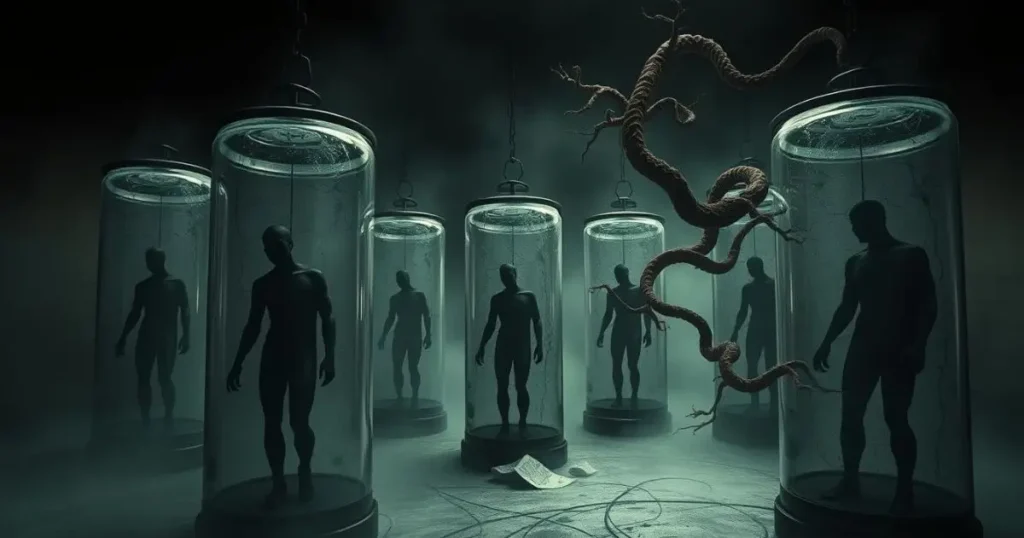I just finished Tender is the Flesh by Agustina María Bazterrica, and… wow, I don’t even know where to begin. This book is unsettling on an entirely different level. The concept alone had me unsettled, but that ending? I had to sit back and process for a moment, maybe re-read the last paragraph a few times, just to make sure I got it. It’s one of those reads that makes you question humanity itself and leaves you feeling, well… hollow.
Table of Contents
How Tender is the Flesh Forces Us to Confront Humanity’s Darkest Depths
Ever wondered just how far we’d go if survival was on the line? Tender is the Flesh by Agustina Bazterrica dives right into that unsettling territory. Imagine a world where a pandemic makes animal meat toxic, and people… well, they start eating each other. It’s a trip through humanity’s darkest corners, forcing you to wrestle with some seriously uncomfortable questions about morality.
The story follows Marcos, a guy working in a facility where they “process” human meat. What’s wild is how casually it all plays out—violence and cannibalism just become everyday stuff. Bazterrica’s mix of horror and sharp social critique makes this book impossible to forget if you’re into dark, thought-provoking reads.
So, what does Tender is the Flesh really dig into? It lays bare our most primal instincts and moral failings, asking us to confront a world where the unimaginable has become routine. Buckle up, because this is humanity stripped down to its rawest form.
Marcos’s Journey through a Disturbing New World

Marcos is our guide in this dark, twisted reality, working at a “meat processing plant” that now deals in humans instead of animals. Through his eyes, we see how this world operates—from the unsettling normalization of violence to the eerie detachment people have developed. Marcos is numb, haunted by loss, but his job forces him to participate in this system, and that’s where the horror kicks in. Bazterrica doesn’t hold back; her writing makes you feel the emotional weight Marcos carries and the bleakness of a society where empathy has vanished.
Following Marcos, you’re not just an observer—you’re forced to feel the ethical tension and ask yourself: in a world like this, where survival blurs all lines, would we all eventually become numb?
The Horror of Normalization: How Violence Becomes Just Another Day
One of the most chilling aspects of Tender is the Flesh is how violence effortlessly slips into everyday life. Through Marcos’s daily life, we see how people have adapted to this twisted new reality—no one even blinks at the brutal details anymore. From the sterile language used to describe “processing” to the casual, business-as-usual conversations about it, the normalization of horror is everywhere. Bazterrica’s writing captures this with unsettling precision, making you wonder: how much of our humanity do we sacrifice just to keep going? It’s a heavy, thought-provoking look at how easily we might accept the unacceptable if it’s what society demands.
Agustina Bazterrica’s Uncompromising Vision of Dystopia
Argentinian author Agustina Bazterrica doesn’t hold back in her grim vision of a world turned upside down by a pandemic that renders all animal meat toxic. With Tender is the Flesh, she paints a society that’s normalized cannibalism to survive, creating a world where privilege and apathy thrive alongside horror.
Bazterrica’s novel has been praised as a “chilling aloofness” that contributes to the disturbing nature of the book, and a “biting and uncompromising expression of societal issues.”
Beyond the horror, Tender is the Flesh serves as a powerful critique of modern society. Bazterrica uses this fictional world to make us look at our own, raising questions about desensitization, consumption, and exploitation. Through the disturbing parallels—factory-like processing, euphemistic language, and society turning a blind eye—she makes us question where we might already be numb to cruelty in our daily lives. It’s like she’s holding up a dark mirror, making us face uncomfortable truths about our own culture and values. This is more than just horror; it’s a raw, unfiltered look at the lengths humanity might go to when morals clash with survival.

Awards and Acclaim for Tender is the Flesh
Since its release, Tender is the Flesh has garnered significant acclaim, solidifying Agustina Bazterrica’s place in contemporary literature. Winning the Clarín Novela Prize in 2017, the novel has been celebrated for its bold storytelling and thought-provoking themes. Its success didn’t stop there; it quickly climbed the ranks to become a USA Today bestseller, capturing the attention of readers and critics alike.
The book has sparked discussions in literary circles, with critics praising its incisive commentary on societal issues. Publications like The New York Times Book Review, Vogue, and Kirkus Reviews have lauded Bazterrica’s ability to weave horror with social critique, drawing parallels between her dystopian world and our own. This acclaim has not only elevated the novel’s status but also opened up dialogues about ethics, survival, and the human condition in our modern world.
With its powerful narrative and unsettling themes, Tender is the Flesh stands as a testament to Bazterrica’s vision, challenging readers to confront the uncomfortable realities of their own existence. This novel is not just a story; it’s a cultural moment, resonating deeply in an age where questions of morality and humanity are more relevant than ever.

“Tender is the Flesh is a masterclass in the art of bodily horror, showcasing Agustina Bazterrica’s unparalleled command of visceral imagery.”
Resonating Impact: Conversations Sparked by Tender is the Flesh
The impact of Tender is the Flesh transcends literary acclaim; it has ignited vital conversations about ethical consumption, societal norms, and the fragility of human morality. Readers often find themselves grappling with the disturbing questions the book raises, sharing their thoughts in book clubs and online discussions. It’s not uncommon to see heated debates about what the novel reveals about our own world, especially regarding how we view and treat others in times of crisis.
Bazterrica’s work invites readers to reflect on their values and the potential consequences of desensitization to violence and suffering. In a time when discussions about social justice and ethical living are more prominent than ever, Tender is the Flesh resonates as a cautionary tale, reminding us of the darkness that can emerge when empathy is lost. This book challenges us not just to think critically, but to engage with the uncomfortable truths about our existence and the world we inhabit.
Conclusion
In conclusion, Tender is the Flesh isn’t just a story—it’s an experience that lingers long after you’ve turned the last page. Bazterrica pushes us to confront the unsettling depths of human nature and the lengths we might go to in the name of survival. This book will likely leave you questioning not only the world within its pages but also the one outside your window. If you’re brave enough to take this journey, prepare for a haunting exploration of morality, empathy, and what it truly means to be human. Trust me, it’s a wild ride you won’t forget anytime soon. So, are you ready to dive into this chilling narrative?
If you’re interested in more book reviews and recommendations, be sure to check out the books section!

